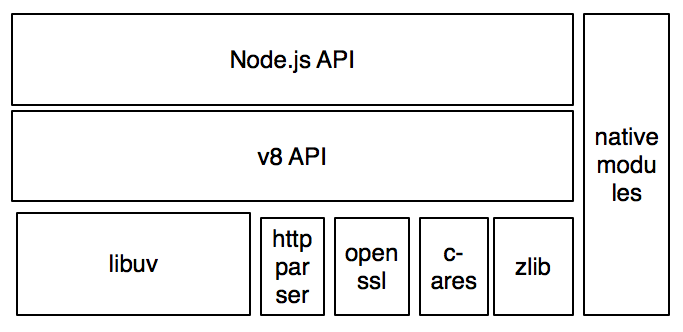Crash Course:
Node.JS WITH EXPRESS
Today's agenda
9:00-9:15AM Introductions
9:15-10:45AM Presentation: How to Think in Node and Express
10:30-10:45AM Morning Break
10:45-11:30AM Guided Tour Through To Do List App in Node/Express
11:30-12:00PM Lunch
12:00-1:30PM Paired Programming Session 1: Build Social Photo Aggregator App
1:30-1:45PM Afternoon Break
1:45-3:00PM Paired Programming Session 2: Add Feature Requests
3:00-3:30PM Review and Next Steps
MEET YOUR MENTOR

- Interest 1
- Project 1
- Etc.
- Etc.
- Git Profile
How to Think
In Node
(and Express)
Presentation
Goals for this PRESENTATION
- Learn the mental model you need to write Node and Express apps
- Understand the essential components of a Node/Express apps
What We'll Cover
- What is Node?
- What is Express?
- Bootstrapping a Node App with NPM
- Working with Modules
- Bootstrapping an Express App
- URL Routing in Express
- Middleware
- Templating with Jade
WHat is Node?
Node.js is a platform built for easily building fast, scalable network applications. Node.js uses an event-driven, non-blocking I/O model that makes it lightweight and efficient, perfect for data-intensive real-time applications that run across distributed devices.
nodejs.org
"
"
WHat is Node?
scalable network applications...
- Node is a framework for writing sever side code in Javascript
- Blah
- Blah
WHat is Node?
event driven
You probably already know the "observer pattern" from the front end:
target.addEventListener('click', function(e) {...});response.on('data', function(d) {...});In Node, we use the same pattern, on the server side:
WHat is Node?
event driven
You probably already know the "observer pattern" from the front end:
target.addEventListener('click', function(e) {...});response.on('data', function(d) {...});In Node, we use the same pattern, on the server side:
Node IS non-blocking

i/o
Database (MongoDB, CouchDB, Redis)
Third-party APIs (Twitter, Facebook, APNS)
Websockets (real-time)
Files (image resizer, video editor)
What is a "scalable ..."

read data from Facebook API
process data
send data to the clienttasks
callbacks
non-linear thinking
pseudocode
callbacks
non-linear thinking
var data = load(...)
var info = process(data)
send(info)What would happen if we ran this in Node?
node
callbacks
non-linear thinking
load(function loaded(data) {
process(data, function processed(info) {
send(info)
})
})
One-to-one dependency
callbacks
events
comparison
Many-to-many "subscription" API
command line
node
...is the package manager for node
npm
(pedantic note: npm does not stand for node package manager)
(duh)
...live at
... & express, grunt-cli, etc.
/usr/local/bin
command line
...is the version manager for node
nvm
(side note: this is more important now that io.js exists)
modules
third-party
connect is
built-in
express is connect plus templating
http.Server
plus static
plus over 130,000 more
(disclaimer: over-simplification)
http(s), fs, url, events, modules
http(s), fs, url, events
modules
how modules work
// model.js
var User = function(name, email) {
this.name = name;
this.email = email;
};// someRoute.js
var Model = require('./model');
var u = new Model.User();module.exports.User = User;how modules work
// user.js
var User = function(name, email) {
this.name = name;
this.email = email;
};// someRoute.js
var User = require('./user');
var u = new User();module.exports = User;(see the difference?)
folders as modules
organizing your code
index.js
package.json
(1)
(2)
how modules work
one more thing...
require()
modules that you
are cached
based on file name
modules
a few favorites...
async
for tasks in a series or in parallel
lodash
for "functional"
/
underscore
tasks like mapping and filtering
passport
for managing authentication
express
A QUICK DETOUR...
REST
GET
retrieves a resource or collection
POST
creates member(s) of a collection
(disclaimer: over-simplification)
REST
GET
http://.../api/coll
...to retrieve a collection
GET
http://.../api/coll/1
...to retrieve specific resource
A QUICK DETOUR...
(disclaimer: over-simplification)
REST
http://.../api/coll
POST
...to create or update a resource
{
"someKey": "someValue"
}A QUICK DETOUR...
(disclaimer: over-simplification)
express
// app.js
var express = require('express');
var app = express();
app.listen(1337);node app.js
npm install express --save
(1)
(2)
(3)
express
your app
// app.js
var express = require('express');
var app = express();app.listen(1337);
// application
// routing logic
// and middleware
// goes here// app.js
var express = require('express');
var app = express();app.listen(1337);routing logic
where do requests go?
app.get('/', function(req, res, next) {
res.status(200).send('hello world');
})// app.js
var express = require('express');
var app = express();app.listen(1337);routing logic
using regular expressions
app.get('/:id([A-Za-z0-9]{10})', function(req, res, next) {
res.status(200).send('hello ' + req.params.id);
});
app.all('/*', function(req, res, next) {
res.status(200).send('hello world');
});
// app.js
var express = require('express');
var app = express();app.listen(1337);routing logic
chaining
app.all('/*', function(req, res, next) {
// authentication logic => 401 or...
next();
});
app.get('/*', function(req, res, next) {
res.status(200).send('hello world');
});
routing logic
advanced topics
vhost
for routing to subdomains
express.Router
to make your
routing logic modular, given a path
Request
function(req, res, next) { ... }
an incoming object
middleware
response
function(req, res, next) { ... }
the outgoing response
middleware
coming up
function(req, res, next) { ... }
go to the next handler, but...
only if no response has been sent
middleware
middleware
// app.js
var express = require('express');
var app = express();app.listen(1337);where does it fit in?
app.get('/', function(req, res, next) {
/* this is middleware */
});middleware
which came first?
// app.js
var express = require('express');
var app = express();app.listen(1337);
app.get(/** 404 middleware **/);
app.get(/** static middleware **/);rendering with templates
templates
using jade
// base.jade
html
head
title Hello World
link(rel='stylesheet', href='/css/base.css')
block head
body
block body
script(src='/js/base.js')// index.jade
extends base
append body
h1 #{message}templates
using jade
// app.js
var express = require('express');
var jade = require('jade');
var app = express();app.listen(1337);
app.set('views', './views');
app.set('view engine', 'jade');
app.get('/', function (req, res) {
res.render('index', { message: 'Hello world!'});
});